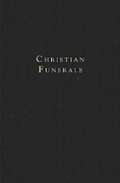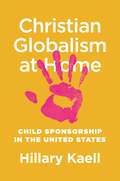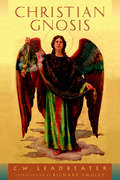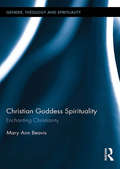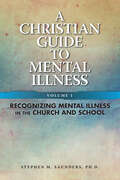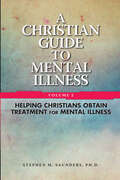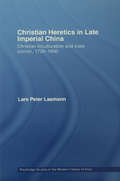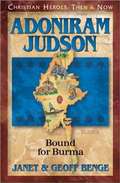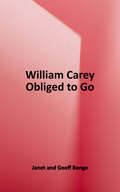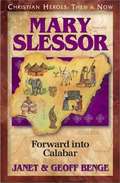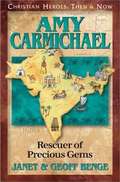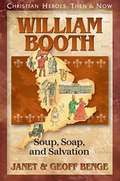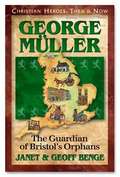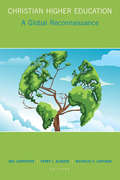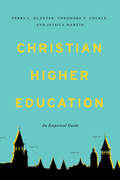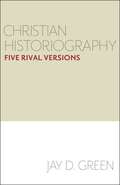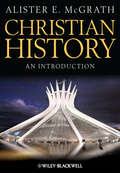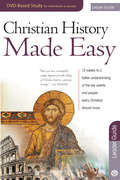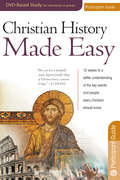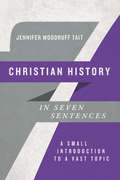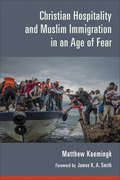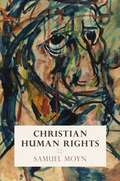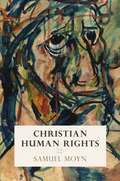- Table View
- List View
Christian Funerals
by Andy LangfordUnlike weddings, funerals rarely take place after extensive planning. Often the deceased is not someone the pastor has known well, and preparations for the service of death and resurrection take place in the midst of pastoral care of the grieving, writing the funeral sermon, and the pastor’s regular duties. These circumstances make it especially hard to plan an appropriate and meaningful order of worship for the funeral service.Christian Funerals will help pastors as they attend to this crucial ministry of the church. Drawing on the books of worship from a number of denominations and traditions, it provides several options for each of the elements of the funeral service, from gathering texts to opening prayers to scripture lessons to final prayers. The book is bound in a way that makes it suitable for use at church services and at the grave side.
Christian Globalism at Home: Child Sponsorship in the United States
by Christian Global Hillary KaellAn exploration of how ordinary U.S. Christians create global connections through the multibillion-dollar child sponsorship industryChild sponsorship emerged from nineteenth-century Protestant missions to become one of today’s most profitable private fund-raising tools in organizations including World Vision, Compassion International, and ChildFund. Investigating two centuries of sponsorship and its related practices in American living rooms, churches, and shopping malls, Christian Globalism at Home reveals the myriad ways that Christians who don’t travel outside of the United States cultivate global sensibilities.Kaell traces the movement of money, letters, and images, along with a wide array of sponsorship’s lesser-known embodied and aesthetic techniques, such as playacting, hymn singing, eating, and fasting. She shows how, through this process, U.S. Christians attempt to hone globalism of a particular sort by oscillating between the sensory experiences of a God’s eye view and the intimacy of human relatedness. These global aspirations are buoyed by grand hopes and subject to intractable limitations, since they so often rely on the inequities they claim to redress.Based on extensive interviews, archival research, and fieldwork, Christian Globalism at Home explores how U.S. Christians imagine and experience the world without ever leaving home.
Christian Gnosis
by Richard Smoley C W LeadbeaterThen shall the candidate be bound upon the wooden cross . . . After the third day he shall be brought back from the dead and carried up to heaven to be on the right hand of Him from whom he came. Surprisingly, these lines are from an Egyptian initiation ritual thousands of years before the Christian drama. Linking the two is just one fascinating element in this profound introduction to esoteric Christianity, as timely today as when it was first published in 1920. Famed clairvoyant Charles Webster Leadbeater was a bishop of the Liberal Catholic Church, which preserves the sacraments while interpreting the scriptures with maximum freedom. He quotes St. Augustine himself saying that what we now call Christianity emerged at the very beginning of humanity as the one true religion. To access its transformative force, Leadbeater returns to original teachings and decodes its story symbolically as a guide for direct knowledge (Gr: gnosis) of the Divine. "As Christ had the Godhead behind Him, so have we the same power, although not yet unfolded as fully," he says. "Nevertheless, it is only a question of development, and that development is certain." With the authority of a scientist and a mystic, he addresses such topics as the birth of Christ in the heart; God's utter love; divine grace; angelic help; the true meaning of salvation; and reincarnation and the evolution of the soul.
Christian Gnosis
by Richard Smoley Charles Webster LeadbeaterThen shall the candidate be bound upon the wooden cross . . . After the third day he shall be brought back from the dead and carried up to heaven to be on the right hand of Him from whom he came. Surprisingly, these lines are from an Egyptian initiation ritual thousands of years before the Christian drama. Linking the two is just one fascinating element in this profound introduction to esoteric Christianity, as timely today as when it was first published in 1920. Famed clairvoyant Charles Webster Leadbeater was a bishop of the Liberal Catholic Church, which preserves the sacraments while interpreting the scriptures with maximum freedom. He quotes St. Augustine himself saying that what we now call Christianity emerged at the very beginning of humanity as the one true religion. To access its transformative force, Leadbeater returns to original teachings and decodes its story symbolically as a guide for direct knowledge (Gr: gnosis) of the Divine. "As Christ had the Godhead behind Him, so have we the same power, although not yet unfolded as fully," he says. "Nevertheless, it is only a question of development, and that development is certain." With the authority of a scientist and a mystic, he addresses such topics as the birth of Christ in the heart; God's utter love; divine grace; angelic help; the true meaning of salvation; and reincarnation and the evolution of the soul.
Christian Goddess Spirituality: Enchanting Christianity (Gender, Theology and Spirituality)
by Mary Ann BeavisThis monograph focuses on "Christian Goddess Spirituality" (CGS), the phenomenon of (mostly) women who combine Christianity and Goddess Spirituality, including Wicca/Witchcraft. Mary Ann Beavis’s study provides ethnographic data and analysis on the lived religious experience of CGS practitioners, drawing on interviews of over 100 women who self-identify as combining Christianity and Goddess spirituality. Although CGS also has implications for Goddess Spirituality and related traditions (e.g., Neopaganism, Wicca), here, CGS is considered primarily as a phenomenon within Christianity. However, the study also shows that the fusion of Christian and Goddess spiritualties has had an impact on non-Christian feminist spirituality, since Goddess-worshippers have often constructed Christianity as the diametrical opposite and enemy of the Goddess, to the point that some refuse to admit the possibility that CGS is a valid spiritual path, or that it is even possible. In addition, biblical, Jewish and Christian images of the divine such as Sophia, Shekhinah, the Virgin Mary, and even Mary Magdalene, have found their way into the "Pagan" Goddess pantheon. The main themes of the study include: overlaps and differences between Christian feminist theology and CGS; the routes to CGS for individual practitioners, and their beliefs, practices and experiences; proto-denominational classifications ("spiritual paths") within CGS; CGS thealogy (Christian discourse about the female divine); and the future of CGS in social scientific and ecclesiological context. Christian Goddess Spirituality will be of interest to scholars of religion, especially those with interests in women and religion, feminist spiritualities, feminist theology/thealogy, alternative spiritualities, New Religious Movements, and emergent Christianities.
Christian Guide To Mental Illness Vol 1: Recognizing Mental Illness in the Church & School
by Stephen M SaundersHow do Christians deal with mental illness?Mental illness is a major problem for many people in society—male or female, young or old, religious or atheist.Christians are certainly no exception; yet, unfortunately, the same stigma surrounding mental illness in society is present in Christian circles too. The first in a two-volume set from author Dr. Stephen Saunders, this book takes an in-depth look at mental illness while also offering grace and encouragement from God’s Word. Saunders describes many common mental afflictions in great detail, including their symptoms, risk factors, and the effects they can have on loved ones. Saunders then presents you with key biblical principles—sin and grace, law and gospel, and others—to show that God is in control and has not deserted those who suffer.By reading this book, you’ll be better prepared to help your loved ones endure whatever mental trials they might be facing.
Christian Guide To Mental Illness Vol 2: Helping Christians Obtain Treatment for Mental Illness
by Stephen M SaundersHow many people suffer from mental illness?Did you know that one in five people, including Christians, will suffer from a mental illness in any given year? This shocking statistic means that many churches will have families who are affected by and struggling with mental illness.This second entry in a two-volume set about mental illness by Dr. Stephen Saunders will help you respond to these difficult circumstances and directing Christian brothers and sisters to the care and support they need, while also reminding them of their Savior’s love.A Christian Guide to Mental Illness, Volume 2 details how core ideas about mental illnesses and their treatments have changed over time. The book also offers guidance to pastors and church workers who wish to provide practical assistance to the people they serve.You will learn how to begin the vitally important conversation on mental illness, prepare for crisis management, recognize the need for professional treatment, assist loved ones, and share with everyone impacted by mental illness the spiritual comfort that only comes from God’s Word.As he did in Volume 1, Dr. Saunders demonstrates in this book a thorough understanding of essential Christian teachings. Both church leaders and church members will find assistance and encouragement in this book as they reach out to family and friends affected by mental illness.
Christian Heretics in Late Imperial China: Christian Inculturation and State Control, 1720-1850 (Routledge Studies in the Modern History of Asia)
by Lars Peter LaamannFollowing the prohibition of missionary activity after 1724, China's Christians were effectively cut off from all foreign theological guidance. The ensuing isolation forced China's Christian communities to become self-reliant in perpetuating the basic principles of their faith. Left to their own devices, the missionary seed developed into a panoply of indigenous traditions, with Christian ancestry as the common denominator. Christianity thus underwent the same process of inculturation as previous religious traditions in China, such as Buddhism and Judaism. As the guardian of orthodox morality, the prosecuting state sought to exercise all-pervading control over popular thoughts and social functions. Filling the gap within the discourse of Christianity in China and also as part of the wider analysis of religion in late Imperial China, this study presents the campaigns against Christians during this period as part and parcel of the campaign against 'heresy' and 'heretical' movements in general.
Christian Heroes - Then And Now - Adoniram Judson: Bound for Burma
by Janet Benge Geoff BengeAs America's first foreign missionary, Adoniram Judson spent thirty-eight years working in Burma, then one of the most hostile countries on earth. Judson was ignored, mocked, beaten, and tortured, yet he never lost sight of his goal to translate the Bible into the Burmese language. Today, over 150 years after his death, his remains the only translation of the Bible in Burmese.
Christian Heroes - Then And Now - William Carey: Obliged To Go (Christian Heroes Ser.)
by Janet Benge Geoff BengeWilliam Carey, "the father of modern missions," displayed a single-minded determination to bring the gospel to the people of India (1761-1834).
Christian Heroes - Then and Now - Mary Slessor: Forward into Calabar
by Janet Benge Geoff BengeWhile many missionaries died within months, this fiery mill worker from Scotland labored in love among the unreached tribes of Africa's Calabar region for thirty-nine years (1848-1915).
Christian Heroes: Rescuer of Precious Gems
by Janet Hazel Benge Geoffrey Francis Benge"Amy Carmichael stood on the deck of the steamer, waving good-bye once again to her old friend Robert Wilson. How could she have known she would never see him or the British Isles again? Amy was certain God had called her to India. Indeed! India would be home for the rest of her life." Amy's life was marked by a simple, determined obedience to God, regardless of circumstances or consequences. Her story and legacy are stunning reminders of the impact of one person who will fear God and nothing else. Driven by love and compassion, and sustained by faith and determination, Amy Carmichael defied the cruel barriers of India's caste system. The story of this young woman from Northern Ireland is a brilliant, sparkling example of God's love generously poured out to "the least of these among us."
Christian Heroes: Soup, Soap, And Salvation
by Janet Benge Geoff BengeHorrified by the poverty and human misery in industrial England, General William Booth and his Salvation Army brought the gospel and life-changing social services to the outcasts of society (1829-1912).
Christian Heroes: The Guardian of Bristol's Orphans
by Janet Benge Geoff BengeThis series chronicles the exciting, challenging, and deeply touching true stories of ordinary men and women whose trust in God accomplished extraordinary exploits for His kingdom and glory. Each inspiring account of a man or woman who answered God s call is a testimony to a real-life adventure of faith and determination.
Christian Higher Education: A Global Reconnaissance
by Joel Carpenter Perry L. Glanzer Nicholas S. LantingaThis book offers a fresh report and interpretation of what is happening at the intersection of two great contemporary movements: the rapid growth of higher education worldwide and the rise of world Christianity. It features on-site, evaluative studies by scholars from Africa, Asia, North America, and South America.Christian Higher Education: A Global Reconnaissance visits some of the hotspots of Christian university development, such as South Korea, Kenya, and Nigeria, and compares what is happening there to places in Canada, the United States, and Europe, where Christian higher education has a longer history. Very little research until now has examined the scope and direction of Christian higher education throughout the world, so this volume fills a real gap.
Christian Higher Education: An Empirical Guide
by Perry L. GlanzerUtilizing a common set of objective institutional markers as a compass, this book guides readers through the terrain of various Christian institutions. The Christian higher education landscape confuses many people. Future students, parents, staff, and even faculty often do not understand the important subtleties and nuances. They need a guide that empirically explores the ways Christian universities operationalize their Christian identity. This book will guide them through the field of Christian higher education and introduce our Operationalizing Christian Identity Guide (OCIG), which identifies the major ways Christian colleges and universities use their Christian identity to make mission, marketing, membership, curriculum, cocurricular, and other decisions (an online spreadsheet of OCIG scores for all the Christian colleges and universities in North America updated in real-time will be available to readers). These markers are identifiable by anyone, no matter their religious or nonreligious background. The OCIG is then employed to provide readers a tour of Protestant, historically Black, Catholic, evangelical/multidenominational, and Eastern Orthodox institutions in the United States and Canada. Parents, students, staff, and faculty will be equipped to engage Christian higher education with a clearer understanding of these key elements and their importance to the mission and purposes of individual institutions and Christian higher education at large.
Christian Historiography: Five Rival Versions
by Jay D. GreenChristian faith complicates the task of historical writing. It does so because Christianity is at once deeply historical and profoundly transhistorical. Christian historians taking up the challenge of writing about the past have thus struggled to craft a single, identifiable Christian historiography. Overlapping, and even contradictory, Christian models for thinking and writing about the past abound―from accountings empathetic toward past religious expressions, to history imbued with Christian moral concern, to narratives tracing God’s movement through the ages. The nature and shape of Christian historiography have been, and remain, hotly contested.
Christian History
by Alister E. McgrathA major new introduction to the global history of Christianity, written by one of the world's leading theologians and author of numerous bestselling textbooks. Provides a truly global review by exploring the development of Christianity and related issues in Asia, Latin America and Africa, and not just focusing on Western concernsSpanning more than two millennia and combining elements of theology, history, and culture, it traces the development of all three branches of Christianity - Catholic, Protestant, and Orthodox - providing context to Christianity's origins and its links to JudaismLooks beyond denominational history at Christianity's impact on individuals, society, politics, and intellectual thought, as well as on art, architecture, and the natural sciencesCombines McGrath's acute historical sensibility with formidable organizational skill, breaking the material down into accessible, self-contained historical periods Offers an accessible and student-oriented text, assuming little or no advance theological or historical knowledge on the part of the reader
Christian History Made Easy Leader Guide
by Timothy Paul JonesPeople and Events Every Christian Should Know In this 12-session DVD-based study, Dr. Timothy Paul Jones takes you through the most important events in Christian history from the time of the apostles to today. He brings to life the fascinating people and events that shaped our world. This isn't dry names and dates. It's full of dramatic stories told with a touch of humor. This series, based on Dr. Jones's popular award-winning book Christian History Made Easy, ties in spiritual lessons believers can glean by looking at the past, and shows how God was still working in his church despite all the ups and downs. You will learn: * The fascinating stories of people such as St. Patrick, Martin Luther, and Augustine. * People who changed history: Constantine, Charlemagne, and Francis of Assisi * How we got the Bible that we read today -- John Wycliffe, William Tyndale and others. * The Middle Ages and the Reformation: Kings and Queens, Monks and Reformers * Where church doctrines and practices originated. * How the Catholic, Orthodox, and Protestant churches came to be. * Reason and Revival - How modernity and the scientific revolution affected Christianity. * How Christianity has spread around the world You don't have to be an expert to lead this 12-session study. Perfect for small groups, Bible studies, or personal use. Ages: Young adult to adult. The Sessions The 12 sessions cover major eras and topics with plenty of stories and humor. You'll cover the early church, monasticism, medieval conflicts, the Protestant Reformation, the Great Awakening, 19th-century missions, modernity, and postmodernism.
Christian History Made Easy Participant Guide
by Timothy Paul JonesPeople and Events Every Christian Should Know In this 12-session DVD-based study, Dr. Timothy Paul Jones takes you through the most important events in Christian history from the time of the apostles to today. He brings to life the fascinating people and events that shaped our world. This isn't dry names and dates. It's full of dramatic stories told with a touch of humor. This series, based on Dr. Jones's popular award-winning book Christian History Made Easy, ties in spiritual lessons believers can glean by looking at the past, and shows how God was still working in his church despite all the ups and downs. You will learn: * The fascinating stories of people such as St. Patrick, Martin Luther, and Augustine. * People who changed history: Constantine, Charlemagne, and Francis of Assisi * How we got the Bible that we read today -- John Wycliffe, William Tyndale and others. * The Middle Ages and the Reformation: Kings and Queens, Monks and Reformers * Where church doctrines and practices originated. * How the Catholic, Orthodox, and Protestant churches came to be. * Reason and Revival - How modernity and the scientific revolution affected Christianity. * How Christianity has spread around the world You don't have to be an expert to lead this 12-session study. Perfect for small groups, Bible studies, or personal use. Ages: Young adult to adult. The Sessions The 12 sessions cover major eras and topics with plenty of stories and humor. You'll cover the early church, monasticism, medieval conflicts, the Protestant Reformation, the Great Awakening, 19th-century missions, modernity, and postmodernism.
Christian History in Seven Sentences: A Small Introduction to a Vast Topic (Introductions in Seven Sentences)
by Jennifer Woodruff Tait"No one whatsoever should be denied the opportunity to give his heart to the observance of the Christian religion." —The Edict of Milan (AD 313)"Light from Light, true God from true God, begotten not made, of one substance from the Father." —The Nicene Creed (325)"When our Lord and Master Jesus Christ said, 'Repent,' he willed the entire life of believers to be one of repentance." —Martin Luther's Ninety-Five Theses (1517)"The church is confronted today, as in no preceding generation, with a literally worldwide opportunity to make Christ known." —The Edinburgh Conference (1910)
Christian Hospitality and Muslim Immigration in an Age of Fear
by James K. Smith Matthew KaemingkAn alternative, uniquely Christian response to the growing global challenges of deep religious differenceIn the last fifty years, millions of Muslims have migrated to Europe and North America. Their arrival has ignited a series of fierce public debates on both sides of the Atlantic about religious freedom and tolerance, terrorism and security, gender and race, and much more. How can Christians best respond to this situation?In this book theologian and ethicist Matthew Kaemingk offers a thought-provoking Christian perspective on the growing debates over Muslim presence in the West. Rejecting both fearful nationalism and romantic multiculturalism, Kaemingk makes the case for a third way—a Christian pluralism that is committed to both the historic Christian faith and the public rights, dignity, and freedom of Islam.
Christian Hospitality and Muslim Immigration in an Age of Fear
by Matthew KaemingkAn alternative, uniquely Christian response to the growing global challenges of deep religious differenceIn the last fifty years, millions of Muslims have migrated to Europe and North America. Their arrival has ignited a series of fierce public debates on both sides of the Atlantic about religious freedom and tolerance, terrorism and security, gender and race, and much more. How can Christians best respond to this situation?In this book theologian and ethicist Matthew Kaemingk offers a thought-provoking Christian perspective on the growing debates over Muslim presence in the West. Rejecting both fearful nationalism and romantic multiculturalism, Kaemingk makes the case for a third way—a Christian pluralism that is committed to both the historic Christian faith and the public rights, dignity, and freedom of Islam.
Christian Human Rights
by Samuel MoynThis edition supports the United Nations Charter, 1945-- To reaffirm faith in fundamental human rights, in the dignity and worth of the human person...
Christian Human Rights
by Samuel MoynIn Christian Human Rights, Samuel Moyn asserts that the rise of human rights after World War II was prefigured and inspired by a defense of the dignity of the human person that first arose in Christian churches and religious thought in the years just prior to the outbreak of the war. The Roman Catholic Church and transatlantic Protestant circles dominated the public discussion of the new principles in what became the last European golden age for the Christian faith. At the same time, West European governments after World War II, particularly in the ascendant Christian Democratic parties, became more tolerant of public expressions of religious piety. Human rights rose to public prominence in the space opened up by these dual developments of the early Cold War.Moyn argues that human dignity became central to Christian political discourse as early as 1937. Pius XII's wartime Christmas addresses announced the basic idea of universal human rights as a principle of world, and not merely state, order. By focusing on the 1930s and 1940s, Moyn demonstrates how the language of human rights was separated from the secular heritage of the French Revolution and put to use by postwar democracies governed by Christian parties, which reinvented them to impose moral constraints on individuals, support conservative family structures, and preserve existing social hierarchies. The book ends with a provocative chapter that traces contemporary European struggles to assimilate Muslim immigrants to the continent's legacy of Christian human rights.
